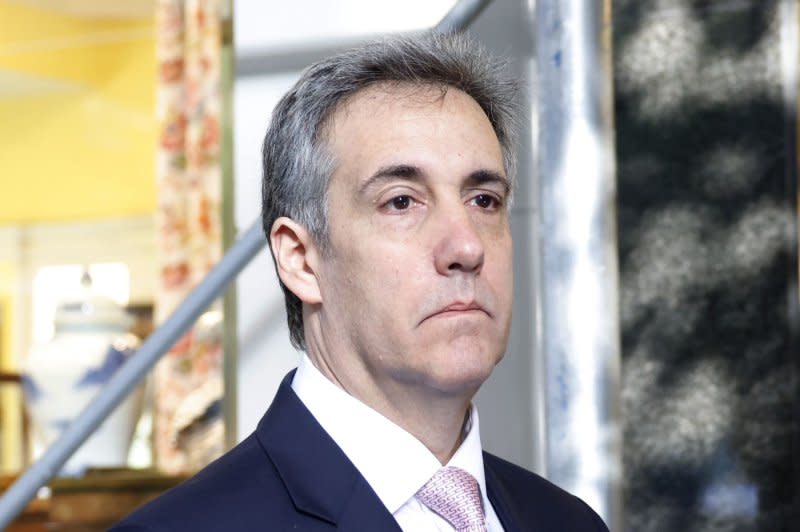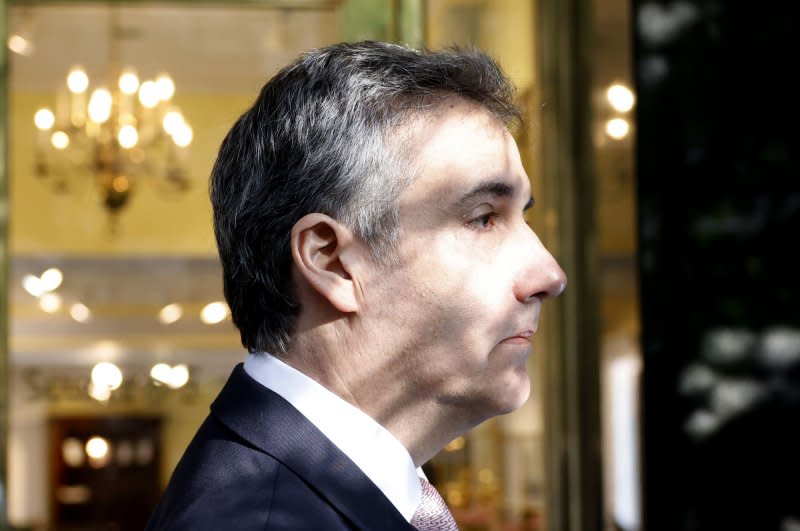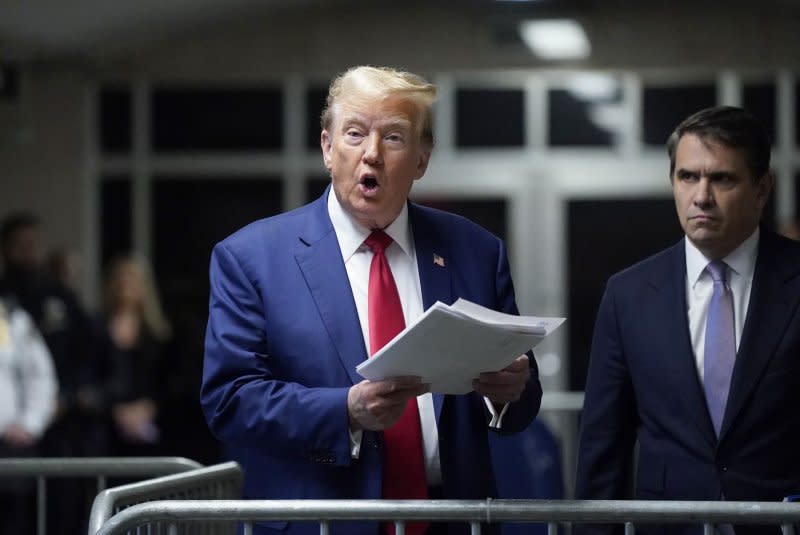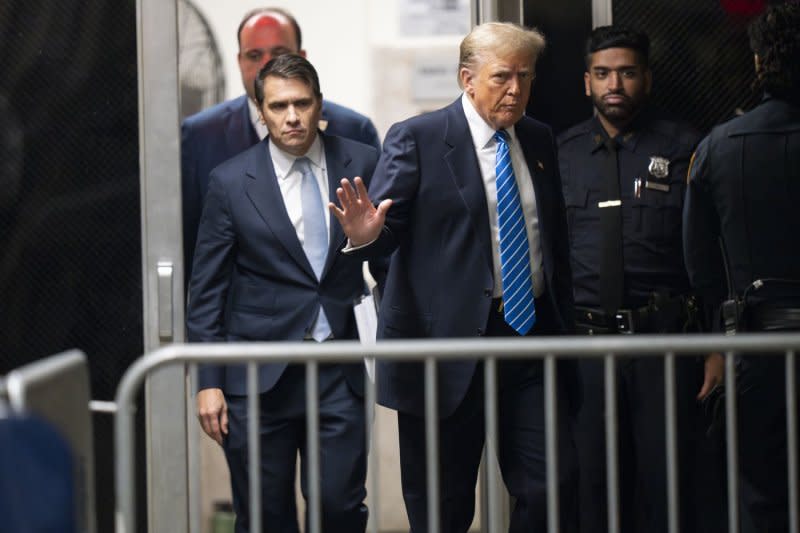Trump hush-money trial: Cohen details hush-money payments, role in alleged schemes

- Oops!Something went wrong.Please try again later.
- Oops!Something went wrong.Please try again later.
- Oops!Something went wrong.Please try again later.
May 13 (UPI) -- Donald Trump's former lawyer Michael Cohen testified about his role in the former president's alleged hush-money schemes and attempts to curry his favor during a trial against the former president in Manhattan courtroom Monday.
Cohen is a key witness for the prosecution as the person alleged to have paid Stormy Daniels to cover up an alleged affair she had with Trump, who stands charged with falsifying business records in order to reimburse Cohen.
Cohen testified that he arranged paying $125,000 for Playboy model Karen McDougal's life rights to a story about her affair with Trump at the former president's direction.
He said he also set up a limited liability corporation to pay for the deal and to keep his association with former National Enquirer publisher David Pecker from being traced to the Trump campaign.
Cohen admitted to misleading the bank about the purpose of the LLC, saying he did not believe the bank would open it if it knew its true purpose.

He said he arranged to buy the rights to the story under direction from Trump, adding he did not personally have any intent or reason to own McDougal's life rights.
"What I was doing, I was doing at the direction of and for the benefit of Mr. Trump," he said.

The jury also heard a recording of a 2016 call from Cohen to Trump, which Cohen said he recorded to show to Pecker so that he "would know that we're going to be paid, Mr. Trump is going to be paying him back." A list of calls between Cohen and Pecker also was shown to the jury.
"I also wanted him to remain loyal to Mr. Trump," Cohen said.

The jury also saw records of wire transfers between Cohen and Keith Davidson, the attorney for adult film actress Stormy Daniels at the time of the hush-money arrangement.
The panel later was shown a side agreement between Daniels and Trump that used pseudonyms for both to disguise the parties involved. Daniels was referred to as Peggy Peterson and Trump as David Dennison.
During the call, that Trump was unaware was being recorded, Trump asks "So, what do we got to pay for this? One-fifty?" which Cohen confirmed.
Cohen then said he discussed "financing" with Trump's chief financial officer, Allen Weisselberg, to which Trump responded, "Listen, what financing?"
Cohen then said they would have to "pay him something," referring to Pecker, at which point Trump instructed him to "pay with cash."
"No, no, no, no, no, I got it," Cohen said, to which Trump replied "Check."
Cohen said the call was cut off because he had received an incoming call.
Cohen said he offered to front Trump the money to pay Daniels, to which Trump was "appreciative.
"He stated to me, 'Don't worry, you'll get the money back," Cohen said.
Cohen was due to be paid $420,000 by Trump in total. This would include a $130,000 reimbursement for paying Daniels, $50,000 for unrelated services, $180,000 in estimated taxes and a $60,000 bonus.
But when Cohen received his bonus it was reduced by about two-thirds. Cohen said he was "beyond angry."
Trump's former attorney called "fixer" a fair description of his role in Trump's inner circle. Cohen said he sometimes bullied people to make Trump happy.
Responding to a question from prosecutor Susan Hoffinger, Cohen confirmed that he did lie for Trump.
"It's what was needed to accomplish the task," he said. "The only thing that was on my mind was to accomplish the task to make him happy."
His duties, Cohen said, included dealing with members of the media such as Pecker.
Pecker and Cohen sometimes communicated through an encrypted messaging app, Signal, according to Cohen.
"Sometimes we thought that encryption and not having the event traceable would be beneficial," Cohen said of his communications with Pecker.
Cohen's communications on behalf of the former president became so expansive that Trump synced his cellphone contacts with Cohen, who amassed about 30,000 contacts on his phone.
Trump began to discuss a run for president with Cohen as early as 2011. When Trump ran for president in 2016, he was worried about negative stories coming out about him.
While Cohen did not have an official role in the Trump campaign, he began to appearon multiple networks on behalf of Trump.
American Media Inc., the company that owned the National Enquirer, began sending covers of its publications to Cohen before they were published. Cohen would also preview stories about Trump's political opponents, including Sen. Marco Rubio, R-Fla., and Hillary Clinton.
The jury already has been shown Trump's signatures on the checks that make up the heart of the case, but some witnesses have thrown doubt on whether Trump had knowledge of their alleged illegal purposes, putting prosecutors under pressure to make Cohen's evidence stick.
The court appearance of Cohen who once described himself as Trump's "spokesman, thug, pit bull and lawless lawyer" is being portrayed as the climax of a years-long grudge match between the two New Yorkers.
Cohen, was expected to testify Trump instructed him to make a $130,000 hush money payment to Daniels, has written that he was so in awe of his boss that he copied his methods including bullying, lying and mocking the rule of law -- even swearing that he would take a bullet for Trump.
"I know where the skeletons are buried because I was the one who buried them," he wrote in his autobiography Disloyal, published in 2020, while he was serving a three-year prison sentence for campaign finance violations on Trump's orders in an effort to influence the 2016 presidential election.
Manhattan District Attorney Alvin Bragg, who attended Monday, is pinning his hopes the claim he was involved in every aspect of Trump's business and personal affairs, was his trusted confidant and facilitated his law-breaking and efforts to avoid responsibility will cut through with jurors.
Once elected, Trump allegedly reimbursed Cohen for the $130,000 he had paid out in installments disguised as billing for "legal services."
"The defendant falsified those business records because he wanted to conceal his and others' criminal conduct," Prosecutor Matthew Colangelo said in his opening statement at the start of the trial April 22.
Trump's defense team is expected to push back against Cohen's testimony by both seeking to undermine his credibility and on legal arguments.
The credibility arguments will center on attempting to portray Cohen, who was convicted of lying to Congress, as a man bent on revenge and point to his books, podcasts and television appearances as evidence the principal motivation for his actions is personal enrichment.
On the law, they will contend that the payments to Cohen legal retainer fees and that it is not illegal to pay someone to stop spreading "unfounded" gossip.
Trump has been fined $10,000 for breaching a gag order preventing him from commenting publicly and on social media about witnesses, including Cohen.
Cohen has attempted to characterize his turning on Trump as part personal mission for redemption and part bid to inform the American people of the dangers of a second Trump term as president.
In March, the trial judge Juan Merchan, rejected motions by Trump's defense team to keep Cohen and Daniels off the stand.
Attorneys wanted Cohen barred on grounds he was a "liar" and had allegedly committed perjury in the past but Merchan ruled there was no precedent for keeping a witness off the stand "because his credibility has been previously called into question."
Merchan ruled Daniels should be permitted take the stand because her testimony was "inextricably intertwined with the narrative of events and is necessary background for the jury."
Daniels took the stand last week, detailing the first time she met Trump and the alleged sexual encounter while facing grilling from the defense team about her decision to sign the non-disclosure agreement brokered by Cohen.
Cohen previously testified in Trump's October 2023 civil fraud trial about how the former president used inflated financial statements to back claims about his net worth, secure deals and reduce insurance premiums.
In court, he detailed a process in which he claimed Trump simply applied whatever the highest price per square foot property in New York was fetching to fix the value of his assets at inflated rates.
Trump has pleaded not guilty to all 34 counts of falsifying business records against him and denies ever having had sexual relations with Daniels.

